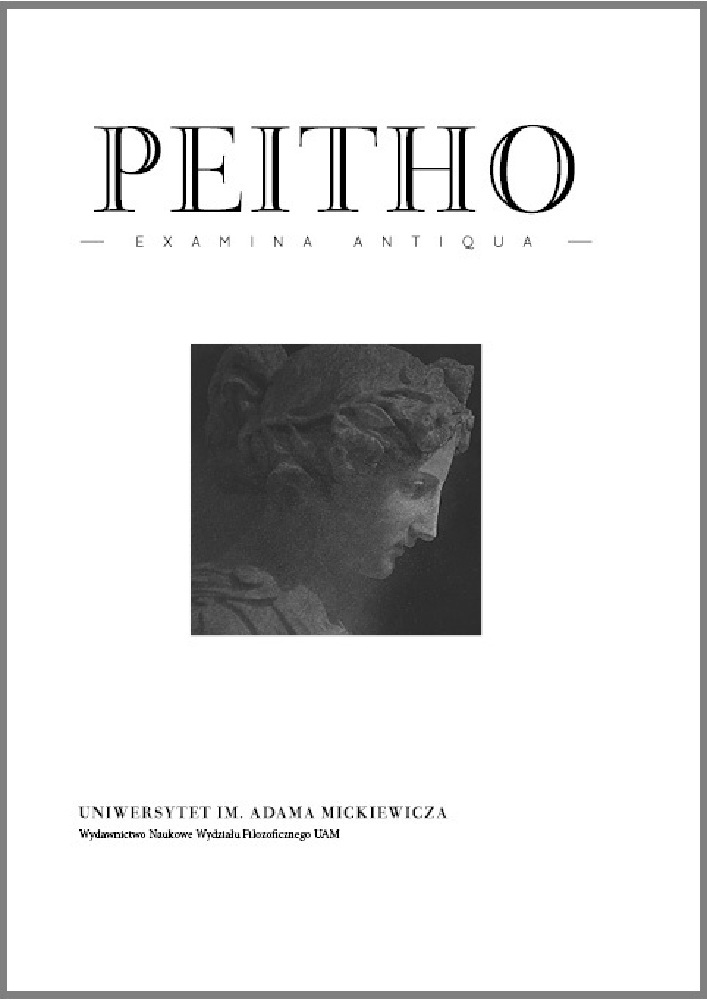Abstract
The purpose of this paper is to show that Plato uses contradictions in the Republic as an impulse to think and to advance in the ascent to the Idea of the good. The procedure to dissolve the main contradictions in the text is that of aphairesis, complementary to that of prosthēsis. Also if they are explicitly named just at the beginning and at the end of the ascent (Books II and VII), I will show that aphairesis and prosthēsis are consistently applied throughout the ascendant argument of Republic I-VII. Starting with the separation of the opposites at the sensible level, the process will continue separating the rational and the irrational in the soul and culminate when explicitly naming the aphairesis of the One/Good at the intelligible level. As will be seen, the opposites in question are unity and indeterminate/indefinite multiplicity. But also if named, the culminating aphairēsis of the Idea of the Good will not be consistently developed in the Republic. Some important allusions to it will also be found in the Parmenides allowing us to solve the main unresolved contradictions in the Republic in consonance with the theory of principles of the agrapha dogmata.
References
Adam, J., 1963a, The Republic of Plato, Cambridge, vol. I.
Adam, J., 1963b, The Republic of Plato, Cambridge, vol. II.
Alcinous, 1993, The Handbook of Platonism, J. Dillon (trans., intr. & comm.), Oxford.
Cotton, A.K., 2014, Platonic Dialogue and the Education of the Reader, Cambridge.
Erler, M., 1987, Der Sinn der Aporien in den Dialogen Platons, Berlin und New York.
Ferrari F., 2000, „Teoria delle idee e ontología”, in: Platone, La Repubblica, M. Vegetti (cur.), Vol. IV, Napoli.
Foley, R., 2008, „Plato’s Undividable Line: Contradiction and Method in Republic VI”, Journal of the History of Philosophy 46, S. 1–24.
Fronterotta, F., 2010, „Plato’s Republic in the Recent Debate„, Journal of the History of Philosophy 48, S. 125–152.
Gaiser, K., 1986, „Platons Zusammenschau der mathematischen Wissenschaften„, Antike und Abendland 32, S. 89–124.
Gutiérrez R., 2009b, „Platón y el neoplatonismo sobre el Bien. En torno a una reciente lectura neoplatónica del Parménides de Platón”, in: O.F. Bauchwitz, C. Cunha Bezerra (eds.), Imagen e Silencio. Actas del I Simposio Ibero-Americano de Estudos Neoplatonicos, t. I: Do Neoplatonismo pagao ao Neoplatonismo Medieval, Natal.
Gutiérrez, R., 2002, „La Lógica de la Decadencia. En torno a las formas deficientes de gobierno en la República de Platón”, in: Estudios de Filosofía 26, S. 43–61 (englische Fassung: „The Logic of Decadence: On the Deficient Forms of Government in Plato’s Republic”, The New Yearbook for Phenomenology and Phenomenological Philosophy 3 (2003), S. 85–102).
Gutiérrez, R., 2003, „La estructura de los símiles de la República como clave hermenéutica”, in: R. Gutiérrez (ed.), Los Símiles de la República VI–VII de Platón, Lima, S. 119–143.
Gutiérrez, R., 2009a, „Algunas consideraciones sobre el símil de la línea”, Areté 21, S. 123–142.
Gutiérrez, R., 2011, „„O mesmo logos vale para o justo e o injusto, o bom e o mau, e para todas as Ideias”. República 476 a 4–5”, In: D.G. Xavier, G. Cornelli (eds.), A República de Platâo, Sao Paulo, S. 137–152.
Gutiérrez, R., 2012, ”Die Stufen der Selbsterkenntnis in Platons Politeia„, in: U. Bruchmüller (hrsg.), Platons Hermeneutik und Prinzipiendenken im Licht der Dialoge und der antiken Tradition. Festschrift für Thomas Alexander Szlezák zum 70. Geburtstag, Hildesheim und Zürich und New York, S. 339–344.
Halfwassen, J., 1992, Der Aufstieg zum Einen. Untersuchungen zu Platon und Plotin, Stuttgart.
Jürgasch T., 2013, Theoria versus Praxis? Zur Entwicklung eines Prinzipienwissens im Bereich der Praxis in Antike und Spätantike, Berlin und New York.
Krämer, H.J., 1966, „Über den Zusammenhang von Prinzipienlehre und Dialektik bei Platon”, Philologus 110, S. 35–70.
Krämer, H.-J., 1997, „Die Idee des Guten. Sonnen und Liniengleichnis (Buch VI 504 a–511 e)”, in: O. Höffe (Hrsg.), Platon. Politeia, Berlin, S. 179–203.
Leroux, G. (trad.), (2002), Platon. La République, Paris.
Platon, 1972, Parmenides, H.G. Zekl (Übers.), Hamburg.
Rickless, S., 2009, Plato’s Forms in Transition: A Reading of the Parmenides, Cambridge.
Santa Cruz, M.I., 2012, „Sobre la categoría de los relativos en Platón y Aristóteteles„, Revista Latinoamericana de Filosofía 38, S. 5–30.
Santas, G., 1983, „The Form of the Good in Plato’s Republic„, in: J.P. Anton, A. Preus (eds.), Essays in Ancient Greek Philosophy, Vol. 2, Albany, S. 232–263.
Strobel, B., 2004, “Attribute der Formen und die Form des Guten. Gerasimos Santas über die metaphysische Theorie des Guten in Platons Politeia“, in: M. Van Ackeren (hrsg.), Platon Verstehen. Themen und Perspektiven, Darmstadt, S. 111–134.
Szlezák, T.A., 2003, Die Idee des Guten in Platons Politeia, Sankt Augustin.
Veggeti, M., 2003, „Dialettica“, in: Platone. La Repubblica, M. Vegetti (cur.), Vol. V, Napoli.
White, N.P., 1979, A Companion to Plato’s Republic, Indianapolis und Cambridge.
License
Peitho provides immediate open access to its content on the principle that making research freely available to the public supports a greater global exchange of knowledge.
